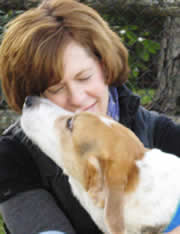The Buddy Project
The Buddy Project is an innovative program which teaches youth who are at risk for school failure how to train rescue dogs. The goal of the program is to provide mutually beneficial experiences for the students and the dogs. The youth learn how to train the dogs using positive based training methods, which supports the dogs’ process towards adoption and also provides the youth with a model for positive social interactions. The dogs learn basic skills, which makes them more appealing to potential adopters.
The Buddy Project: Frequently Asked Questions
Q: What is The Buddy Project?
A: The Buddy Project pairs youth who are at risk for school failure with homeless dogs from the Sanctuary. While learning how to train the dogs, the youth also learn how to engage with them in a positive manner that promotes empathy.
Q: Who can benefit from The Buddy Project?
A: The Buddy Project works with youth with Asperger’s, ADHD, learning disabilities, and significant emotional problems. Some of the youth have experienced trauma, are in the foster care system, or are experiencing other life challenges.
Q: How are youth referred to the program?
A: Social workers, therapists, teachers and parents identify and refer youth who may benefit from this program.
Q: What are some of the basic goals of The Buddy Project?
A: General program goals include providing the dogs with positive‐based training and socialization experiences to aid in their rehabilitation and enhance their chances for successful adoptions. Goals for the students include providing them with a humane education experience that helps to develop a sense of achievement and feelings of empathy.
Q: What are some of the therapeutic benefits of The Buddy Project?
A: The program provides the youth with an opportunity to engage in an activity outside of their school or traditional therapeutic environments. It can simulate a work experience for some, teaching them the importance of honoring commitments and fulfilling responsibilities. According to the literature on animal assisted interactions (AAIs), engaging with animals can serve as a catalyst to help support the development of other social interactions. Involvement in positive‐based dog training approaches can serve as a model for positive and appropriate interpersonal interactions outside of the training sessions.
Q: How are individual goals developed?
A: The Buddy Project collaborates with referring partners to develop individualized, measurable goals for each student. Goals for the Sanctuary dogs are developed in collaboration with Our Companions’ Canine Operations Director. When one of “their” dogs is adopted, youth are encouraged to remain within the program to help another dog in need.
Q: Where do the Buddy Project dogs come from?
A: Most of the dogs reside at the Sanctuary in Ashford.
Q: How are dogs selected for the program?
A: All dogs are temperament‐tested by Our Companions’ Canine Operations Director. Dogs that are selected have demonstrated high sociability and are considered highly trainable. Individual needs and goals are taken into consideration when pairing a student with a dog.
Q: Where do The Buddy Project sessions take place?
A: Most Buddy Project sessions occur at the Sanctuary in Ashford, CT. Some sessions are held at the Valerie Friedman Program Center in Manchester, Connecticut.
Q: How often do sessions occur?
A: Sessions are offered once a week for an hour.

Risa G. Davidson, M.S.
Dog Trainer
The Buddy Project Manager
Risa has an undergraduate degree in special education from the University of Connecticut and a Master’s Degree in special education from Central Connecticut State University. She taught learning disabled children for six years in Woodstock, CT. After receiving her Master’s Degree, Risa entered into private practice in Hartford, CT. As a special education consultant for eleven years, she specialized in diagnostics and developed individualized education programs for learning disabled children around the state.
Risa developed an interest in dog training about 15 years ago. As her interest in dog training grew, Risa became an avid reader of material on canine behavior. She volunteered in the dog socialization program at the Connecticut Humane Society for a year and a half. She also participated in pet therapy work at area nursing homes and schools for several years. She attended numerous conferences on canine behavior and training. Risa completed the Instructors’ Training Course at Sue Sternberg’s shelter in Accord, New York in May 2003. She joined Our Companions in 2003 and became an active participant in the Canine College program. She began assisting in classes at that time and was promoted to instructor in the fall of 2004. As a head teacher, she continues to remain actively involved in the canine programs at Our Companions.
She currently manages the Buddy Project, teaching youth how to train homeless dogs from Our Companions Animal Sanctuary to increase their adoptability. Dogs recently rehomed by Our Companions have also been included in this program in an effort to provide the families with ongoing support to help ensure the success of the adoptions.
In August 2013, Risa completed the Animal and Human Health Certificate Program through the University of Denver Graduate School of Social Work’s Institute for the Human Animal Connection. The eight-month professional development program consists of courses studying the therapeutic and educational benefits of a wide variety of Animal Assisted Interactions (AAIs).
